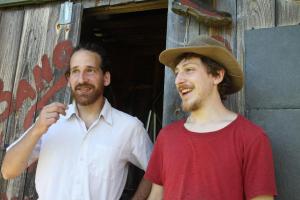Interns Bring New Energy to Farm and Forest

From May through August, two new interns contributed significantly to ongoing sustainability efforts in two key areas. Jacob Lepkoff and Taliesin Haugh brought a wealth of experience to their roles in the community farm and the forest reserve, respectively, and helped move the college toward goals in each case.
“These new community members help keep things moving over the summer, when there is most to be gained in managing both the farm and the forest reserve, but when our capacity is usually at its minimum,” says Todd Smith, chemistry professor. As the sustainability projects manager, Todd was instrumental in searching for and hiring these two very qualified interns. “This was a trial run for this summer, to be assessed for possible repetition in future years.”
“Working with any biological system, you interact with so many living pieces of that system,” said Jacob, who graduated from Sterling College with a bachelor’s in sustainable agriculture and has worked on a number of farms for 10 seasons. “It’s a joy to work in a living system because you are forced to observe and guess continuously. It is very engaging and rewarding. With every new experience I feel I’m offered a new opportunity to improve my guesses.”
Jacob worked closely over the summer with students Claire O’Pray ’20 and Emerson Gray Koetter ’22, who were able to pursue their own research interests as well as maintain the farm and produce some food. Taliesin, who recently completed his master’s in sustainable development at SIT Graduate Institute, worked more independently on the forest reserve, but was available as a resource for students conducting research there such as Hailey Mount ’20.
“This internship is an exciting opportunity to build the key systems knowledge, frameworks, and skills required to help facilitate a larger societal shift toward sustainable land management, as well as place-based community building,” said Taliesin. “Marlboro took on a huge commitment with this forest reserve, and it’s exciting but daunting to be here at the ground floor of decades of continuous work and research. I hope we set a good foundation for future students and faculty to build on for years to come.”
